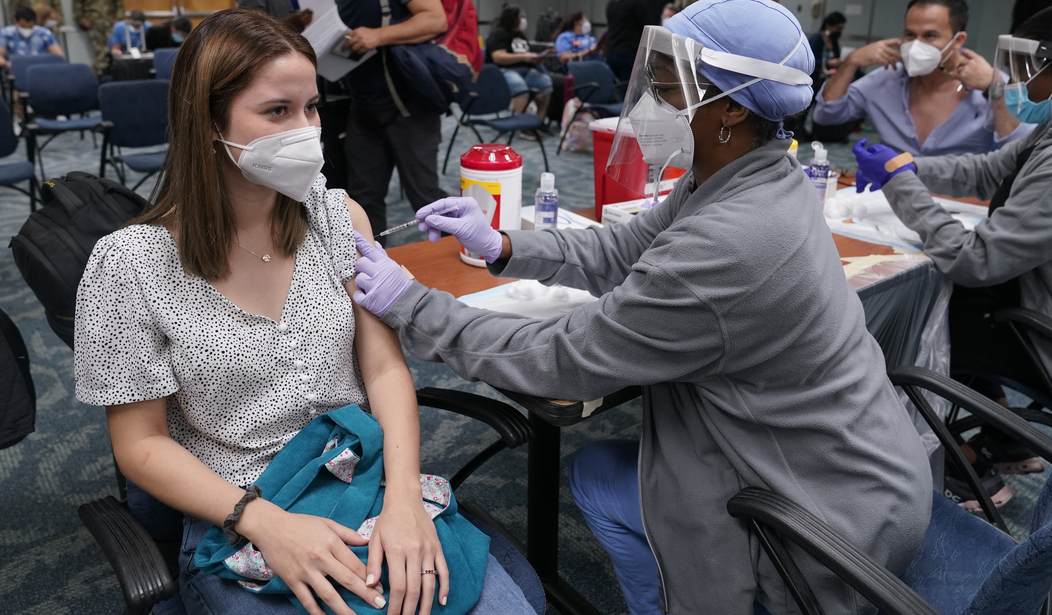If it’s more effective than we thought at preventing symptomatic illness, does that also mean it’s more effective than many assume at preventing transmission from the vaccinated to the unvaccinated?
Because if it is, maybe we don’t need any new CDC mask guidance after all.
This study published yesterday in the New England Journal of Medicine comes from the UK, where they’re using Pfizer and AstraZeneca. Question: Because the Delta variant is so contagious, shouldn’t we expect the vaccines to be somewhat less effective at preventing symptomatic illness from it? The answer from these researchers: Not really. Both vaccines are a little less effective against Delta than against the next-most contagious variant, Alpha. But only a little.
Effectiveness after one dose of vaccine (BNT162b2 or ChAdOx1 nCoV-19) was notably lower among persons with the delta variant (30.7%; 95% confidence interval [CI], 25.2 to 35.7) than among those with the alpha variant (48.7%; 95% CI, 45.5 to 51.7); the results were similar for both vaccines. With the BNT162b2 [Pfizer] vaccine, the effectiveness of two doses was 93.7% (95% CI, 91.6 to 95.3) among persons with the alpha variant and 88.0% (95% CI, 85.3 to 90.1) among those with the delta variant. With the ChAdOx1 [AstraZeneca] nCoV-19 vaccine, the effectiveness of two doses was 74.5% (95% CI, 68.4 to 79.4) among persons with the alpha variant and 67.0% (95% CI, 61.3 to 71.8) among those with the delta variant.
Note that that’s 88 percent effective at preventing symptomatic illness, not 88 percent effective at preventing infection. Some meaningful number of vaccinated people are going to get infected by Delta. And based on the data being collected from NBA players, they may be shedding a lot of virus while they are:
Breakthrough infections in the leagues seem to be more common with the Delta variant than with Alpha, the variant first identified in Britain, he said. As would be predicted, the vaccines cut down the severity and duration of illness significantly, with players returning less than two weeks after becoming infected, compared with nearly three weeks earlier in the pandemic.
But while they are ill, the players carry very high amounts of virus for seven to 10 days, compared with two or three days in those infected with Alpha, Dr. Sikka said. Infected players are required to quarantine, so the project has not been able to track whether they spread the virus to others — but it’s likely that they would, he added.
So … we probably are going to see some new CDC mask guidance. Everyone will be asked to mask up to try to protect the unvaccinated from the consequences of their own inaction.
A few weeks ago an Israeli study claimed that Pfizer was “only” 64 percent effective at preventing infections by Delta but very strong (94 percent) at preventing severe illness. Israeli scientist Eran Segal posted new data today that broadly confirms those results but suggests that Pfizer may be even weaker at preventing infections than thought.

Very good results at preventing severe COVID and hospitalizations — but just 41 percent effective at preventing symptomatic illness, less than half of the 88 percent figure from the British study published in the NEJM today. I don’t know how to square that, unless the British study was skewed towards younger people who’d been vaccinated more recently and whose antibody levels were still high. As you can see in the graph, Israelis who were immunized back in January are only weakly protected against infection and symptomatic illness now. Not coincidentally, that group is filled with older people, who were first in line for the vaccine because of their higher risk from COVID. What this data’s showing, in other words, is that immunity may be waning now among senior citizens, making them quite vulnerable to catching Delta and getting sick but still not very vulnerable at all to dire consequences.
No wonder the CDC’s suddenly huddling about booster shots for certain at-risk groups.
Either way, sickness and death are the important things, not infections. And the vaccines are doing a stellar job of preventing those in the UK right now despite the massive wave of cases they’re seeing over there:
COVID deaths lag confirmed COVID cases by 2 weeks, according to UK data.
I created a chart comparing UK cases (lagged 2 weeks) & deaths to see how the third wave (with delta variant) is going relative to previous 2 waves.
Vaccination has severed the link between cases & deaths: pic.twitter.com/4OQ6jGNRH0
— Alec Stapp (@AlecStapp) July 21, 2021
New data from Texas also shows how well the vaccines have stood up so far. Of the nearly 9,000 deaths from COVID in the state since February, just 43 were vaccinated people. That means 99.5 percent were unvaccinated. Whether that will continue to hold true with the arrival of Delta is anyone’s guess, but so far this month Texas’s experience mirrors the UK’s, with cases having tripled in a month (“We never thought we would get back to this level this soon,” said one Austin doctor) but deaths still near rock bottom. The vaccines are still doing their most important job, keeping infected people out of the morgue.
But for those who aren’t vaxxed, the risk is higher than it’s been in months. I’ll leave you with this from WaPo, which had the interesting idea of analyzing state numbers on hospitalizations and deaths by removing the vaccinated population from the equation. What percentage of the unvaccinated, specifically, are landing in the hospital right now? In some states the answer turns out to be similar to the rate during the dark days of the winter wave. And it’s only going to get worse as Delta keeps spreading.









